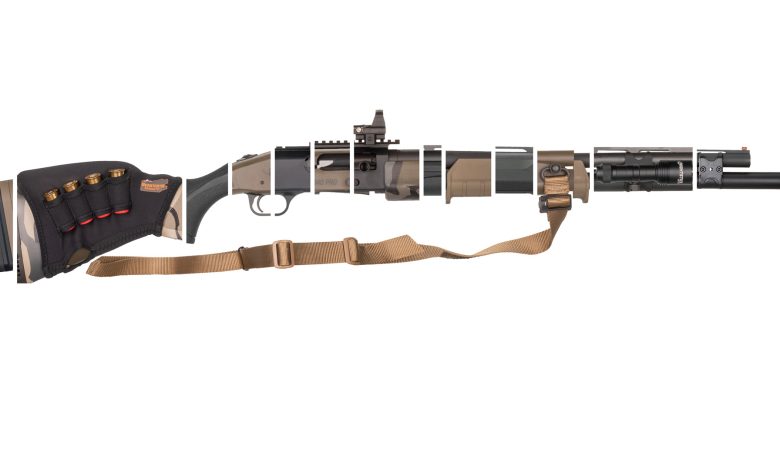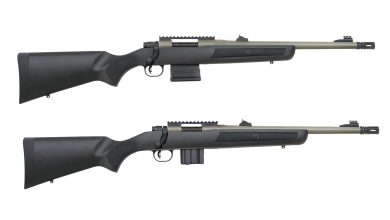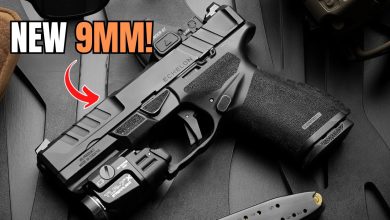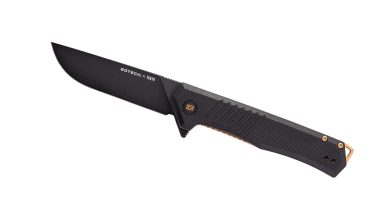The Ultimate Home Defense Shotgun

I’ve written plenty in these pages about the “ultimate” shotgun for home defense, but really what I was talking about was my idea of the perfect shotgun for that role. Yours may be different, and, in fact, it probably is. To choose a shotgun system tailored perfectly for you, first answer some questions:
What’s your budget?
Not everyone has $2,500 laying around for a new gun purchase—believe me I understand! But, do you have $1,500? $1,000? $500? Before embarking on this project, list the amount of dough in total you can swing, then go from there.
Pump, semi-automatic or other action?
We can argue all day about the pros and cons of semi-automatic versus pump actions, but here are some generalities: If your budget is low, choose a reputable pump instead of a bargain semi-auto. If you aren’t experienced with either type, consider a reputable semi-auto, as these offer significant recoil mitigation, and they do not require as much muscle memory (i.e. training) to fire in rapid succession without any hiccups. If reliability is your primary concern—and/or you intend to use the shotgun in extreme conditions such as salty, frigid or sandy environments—choose a pump. Lastly, before you buy a specialty shotgun that may seem great on paper, such as the IWI Tavor TS12, KelTec KSG or one of the many AK-47 shotgun clones, for example, shoot one first. In many cases these cool-looking guns are tough to operate, non-intuitive and they kick like mules.
Have you hunted or shot skeet/clays frequently with one model/brand of shotgun?
Although it isn’t necessarily true that one brand makes the best guns for hunting and also for home defense, if you are familiar with one type of shotgun, it can behoove you to choose a similar model for home defense. That’s because when the chips are down, very few things outweigh familiarity with the gun you’re holding. For example, people who hunt or shoot clays frequently with a certain type of shotgun can often load, unload and manipulate that gun almost subconsciously, without looking. That’s mighty handy in a dark hallway. So, if you can’t decide between several guns, the one you are most familiar with could be the deciding factor, assuming both models of the same-brand gun feature similar actions and controls.
Where will you primarily be storing the shotgun?
If you plan to store the gun for long periods without cleaning it, or if you plan to keep it in a non-climate-controlled environment, strongly consider a shotgun with a nickel, “marine” or other robust finish that’s more resistant to the elements than blue steel.
Do you plan to use it for sporting and/or hunting purposes, too?
If you’ve decided you will only be buying one shotgun for all uses, such as hunting and home defense, there are plenty of good options. Lean toward a mid-length barrel—such as 24 or 26 inches—buy a cylinder choke for it, and you’ll be fine. Another option is to buy an additional barrel. For example, if the shotgun comes with a 28-inch barrel for hunting, buy an additional 18- or 20-inch barrel for home defense. Finally, if you really want to up your hunting gun’s defensive capability, buy an extended magazine. I believe seven or eight shots is better than four or five when your life is on the line.
How recoil sensitive are you?
For all but the smallest stature shooters, I’d recommend a 12-gauge with average-power loads. Beware, however, that if you do choose a 20-gauge because you assume it has less recoil, make sure the gun is of adequate overall weight (7 to 8 pounds), or otherwise you’ll wind up with a less powerful gun that kicks just as hard as a 12 gauge. Perhaps more importantly, make sure the shotgun you choose fits you well in terms of stock length and comb height so that your cheek is firmly planted on the comb as you look down the barrel; shotguns that are too short for the shooter often hurt more than stocks on the long side. Next, find out if it comes with stock shims that make it user adjustable, and if it does, take the time to utilize them. Make sure your shotgun has a substantial recoil pad.
What accessories do you really need on your shotgun?
In my opinion, all a home defender actually needs in the way of accessories attached to the shotgun are a good flashlight, a basic sling and possibly a sidesaddle-type shell carrier to hold a few extra shells. If your shotgun didn’t come with an extended magazine, consider adding one.
Have you shot your shotgun a lot?
Only through experience will you be able to discern for yourself whether the “ultimate shotgun” you created lives up to its billing. Plenty of times after shooting, you’ll learn that the stock is too short, the gun jams with certain ammo or it’s difficult to load because the loading gate is too narrow for your fingers—or any number of other problems. Modify your shotgun accordingly and continue to practice with it until it’s perfect. Only then will it truly be the ultimate home defense gun for you.
Read the full article here







